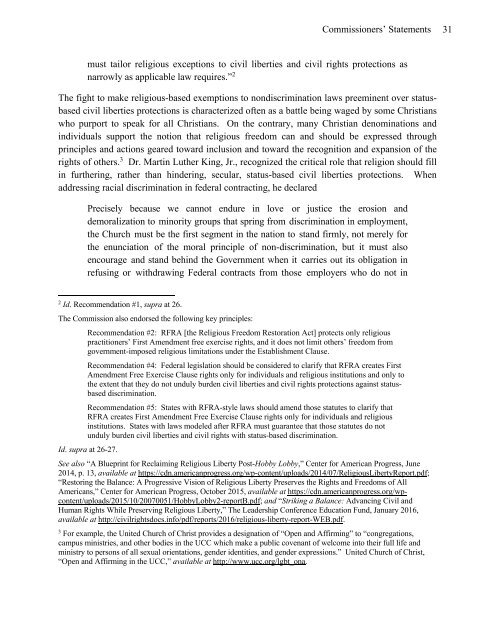PEACEFUL COEXISTENCE
2cgDkdT
2cgDkdT
Create successful ePaper yourself
Turn your PDF publications into a flip-book with our unique Google optimized e-Paper software.
Commissioners’ Statements<br />
33<br />
Executive Order which prohibits federal contractors from discriminating upon the basis of gender<br />
identity or sexual orientation 8 is quite clear. Most are thinly-veiled attempts to turn back the<br />
clock, and will fall to constitutional challenge as overbroad and motivated by animus.<br />
A. First Amendment Defense Acts purport to elevate sweeping protections for religious<br />
freedom above status-based nondiscrimination laws and policies. Observers on the<br />
left and right doubt their constitutionality.<br />
The federal government and state governments are considering so-called “First Amendment<br />
Defense Acts.” In most relevant part, the June 2015 federal proposal would forbid the federal<br />
government from taking<br />
any discriminatory action against a person (defined to include for-profit<br />
corporations), wholly or partially on the basis that such person believes or acts in<br />
accordance with a religious belief or moral conviction that marriage is or should<br />
be recognized as the union of one man and one woman, or that sexual relations are<br />
properly reserved to such a marriage. 9<br />
It is critical to note that some important conservative analysts oppose these acts. Among others,<br />
both the Cato Institute and The Volokh Conspiracy have voiced serious concerns about their<br />
fairness and constitutionality. Walter Olson, Senior Fellow at the Cato Institute, exposed the<br />
hypocrisy of the First Amendment Defense Act by highlighting that<br />
8<br />
Exec. Order No. 13,672, 79 Fed. Reg. 42,971 (July 21, 2014).<br />
9<br />
H.R. 2802, sec. 3(a), 114th Cong. (2015), available at https://www.congress.gov/bill/114thcongress/house-bill/2802.<br />
See also S. 1598, available at https://www.congress.gov/bill/114th-congress/senate-bill/1598/text.<br />
Although the reference to “discriminatory action” is vague, the Act then specifies several<br />
examples of such action, including revoking “an exemption from taxation under section 501(a) of<br />
the Internal Revenue Code,” and denying “any Federal grant, contract . . . license, certification,<br />
accreditation, employment, or other similar position or status from or to such person.” The<br />
specificity of what religiously motivated actions are insulated from federal sanction and which<br />
punitive measures by government are barred is in quite sharp contrast to the sweeping and vague<br />
generalities of a scheme like RFRA or its state counterparts. [footnotes omitted.]<br />
Lupu, Ira C., “Moving Targets: Obergefell, Hobby Lobby, and the Future of LGBT Rights,” 7 Alabama Civ. Rts. &<br />
Civ. Lib. L. Rev 1, pp. 32 - 33 (2015), GWU Law School Public Law Research Paper No. 2015-15; GWU Legal<br />
Studies Research Paper No. 2015-15, available at<br />
http://scholarship.law.gwu.edu/cgi/viewcontent.cgi?article=2373&context=faculty_publications.<br />
During the Presidential primary season for the 2016 election cycle, some Republican candidates either signed or<br />
swore fealty to following statement: “If elected, I pledge to push for the passage of the First Amendment Defense Act<br />
(FADA) and sign it into law during the first 100 days of my term as President.” The American Principles Project and<br />
Heritage Action for America proffered the pledge to all Republican candidates for consideration. See Schweppe, Jon,<br />
“Six Candidates Pledge to Sign First Amendment Defense Act Within First 100 Days,” The Pulse, Dec. 17, 2015,<br />
available at http://thepulse2016.com/jon-schweppe/2015/12/17/six-candidates-pledge-to-sign-first-amendmentdefense-act-within-first-100-days/.


